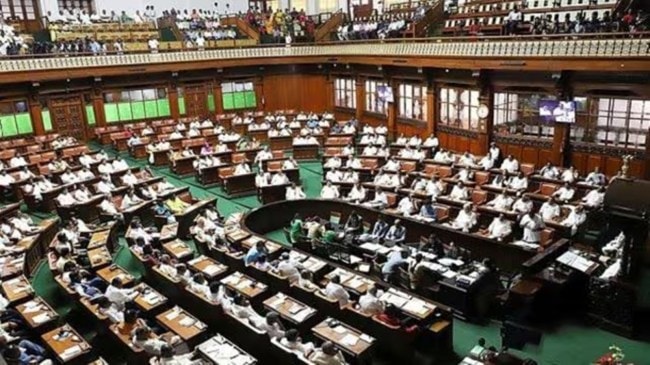Opinion Reservation for Muslims in Karnataka: Not a matter of religion
A sub-category comprising only Muslim communities may seem problematic, but as long as sub-category 2 (B) exists, denying benefits of reservation, in whatever fields, would be unjust and discriminatory
 In Karnataka, the category of OBCs is divided into five sub-categories. (Source: ANI)
In Karnataka, the category of OBCs is divided into five sub-categories. (Source: ANI) Last Friday, the Karnataka government passed the Karnataka Transparency in Public Procurements (KTPP) Bill (Amendment), 2025, providing reservation in public contracts to different categories, including Muslims, designated as OBCs. As anticipated, this sparked a political debate both in the state and at the Centre. Given its stand on religion-based quota, the BJP has opposed the reservation, pointing to the lack of constitutional propriety. However, for Congress, this reservation is based on socio-economic backwardness and not religion, and hence, legally consistent.
Is the amendment to KTPP an “unconstitutional misadventure” as dubbed by the BJP? To understand the larger issue, one needs to look at the legal/constitutional underpinnings of the OBC category, the manner in which sub-classification of OBCs is done, and quotas are allocated to different sub-categories.
Under Articles 15(4) and 16(4) of the Constitution, the category of OBCs is religion-neutral. Keeping this in view, the Mandal Commission included many non-Hindu communities in the list of “Backward Classes”. For identifying OBCs among non-Hindus, it created some criteria: (a) All untouchables converted to any non-Hindu religion and (b) Such occupational communities known by the name of their traditional hereditary occupation, and where Hindu counterparts were included in the list of other backward classes.
In 1992, the nine-judge constitutional bench of the Supreme Court, in the Indra Sawhney v Union of India case, examined the constitutionality of the criteria adopted by the Mandal Commission to identify OBCs. It was unequivocal about the inclusion of Muslims, as of other religious communities, in the category. It held that “inadequate representation is not confined to any specific section of the people, but all those who fall under the group of social backwardness, whether they are Shudras of the Hindu community or similarly situated other backward classes of people in other communities, namely, Muslims, Sikhs, Christians, etc.” Moreover, to ensure that benefits of reservation reach “poorer and weaker sections” of the Backward Classes based on “degrees of social backwardness,” the apex court also allowed for creating different sub-categories.
In Karnataka, the category of OBCs is divided into five sub-categories. Included in Category 1 are 391 subgroups, of which 17 belong to Muslims. Category 2A consists of 399 groups, 19 of them from the Muslim community. Subgroups placed under this category are entitled to 15 per cent reservation. The quotas for the sub-categories 3 (A) and 3 (B) are 4 per cent and 5 per cent respectively. What has, however, been at the centre of the controversy is the sub-category 2 (B), created in 1994 to include Muslims, and SC converts to Buddhism and Christianity. A total of 6 per cent was set aside for this category (4 per cent for Muslims and 2 per cent for SCs who converted to Christianity and Buddhism). This was challenged in the Supreme Court. In its interim order, the Supreme Court directed the state government to limit all reservations to 50 per cent. But it did not question the legality of the sub-category 2 (B) per se. In 1995, H D Deve Gowda, the then Chief Minister of Karnataka, shifted SCs who converted to Christianity and Buddhism into subcategories 1 and 2 (A) respectively, to leave Muslims alone in the subcategory 2 (B) with 4 per cent reservation.
Subsequent governments, including the ones led by the BJP, did not tamper with this arrangement. Interestingly, the BJP government in Karnataka, led by Sadananda Gowda, ordered in 2013 that all Muslims, except for nine sub-castes, be considered backward classes eligible for central OBC reservations. However, just ahead of the 2023 assembly polls, the BJP government led by Basavaraj Bommai proposed to restructure the OBC category by doing away with categories 3 (A) and 3 (B), and erasing the subcategory 2 (B). Instead, he proposed to include them in the 10 per cent quota for the economically weaker sections (EWS). However, this proposal was met with stiff political opposition. Eventually, the matter reached the Supreme Court. On April 13, 2023, the apex court, while commenting on the government’s decision to scrap the 4 per cent OBC quota for Muslims, said that it “appears to suggest …the foundation of its decision-making process is highly shaky and flawed”. In effect, the category of 2 (B) continues to exist, so does 4 per cent reservation for Muslims under this sub-category.
Let us now turn to amendments to the KTPP Act, 1999. The KTPP (Amendment) Bill, 2024 provided that “the tender inviting authority shall, in the notified Departments out of those construction works, value of which does not exceed rupees one crore such number of works not exceeding 4 per cent be tendered only among the tenderers belonging to the backward castes as specified in Category-I as Backward Classes and such number of works not exceeding 15 per cent to be tendered only among tenderers belonging to backward castes as specified in Category II (A) as Backward Classes notified by the Government.” Thus, the sub-category 2 (B) was left out. Ideally, reservation should have been for all the subcategories of OBCs. The KTPP Amendment Bill (2025) seeks to extend the reservation benefits to the categories left out in the earlier Amendment Act.
It may be well argued that if there existed a provision of reservation in government contracts, such benefits must permeate all categories and subcategories. The KTPP Amendment Bill (2025) appears to do just that. A sub-category comprising only Muslim communities may seem problematic, but as long as sub-category 2 (B) exists, denying benefits of reservation, in whatever fields, would be unjust and discriminatory.
(The writer is associate professor, CSDS)






